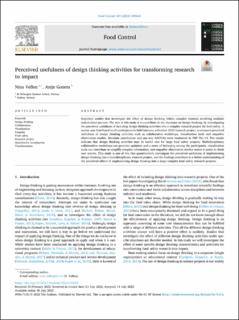Perceived usefulness of design thinking activities for transforming research to impact.
Peer reviewed, Journal article
Published version
Date
2022Metadata
Show full item recordCollections
- Scientific articles [2181]
Abstract
Empirical studies that investigate the effect of design thinking within complex contexts involving multiple stakeholders are rare. The aim of this study is to contribute to the literature on design thinking, by investigating the perceived usefulness of including design thinking activities into a complex research project for food safety. A survey was distributed to all participants in SafeConsume, a Horizon 2020 research project, to measure perceived usefulness of design thinking activities such as collaborative workshops, visualization tools and empathic observation studies. Bivariate correlations and one-way ANOVAs were conducted in JMP Pro 14. The results indicate that design thinking activities may be useful also for large food safety projects. Multidisciplinary collaborative workshops can generate optimism and a sense of belonging among the participants, visualization tools can contribute to simplify complex information, and empathic observation studies makes it easier to think user centric. This study is one of few that quantitatively investigate the perceived usefulness of implementing design thinking into a multidisciplinary research project, and the findings contribute to a better understanding of the perceived effects of implementing design thinking into a large complex food safety research projects. Perceived usefulness of design thinking activities for transforming research to impact.

